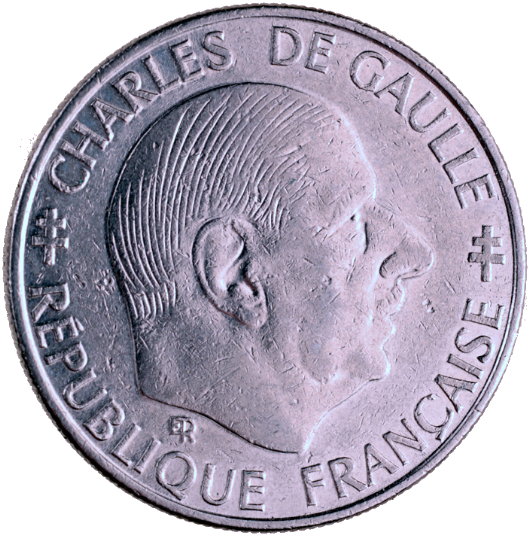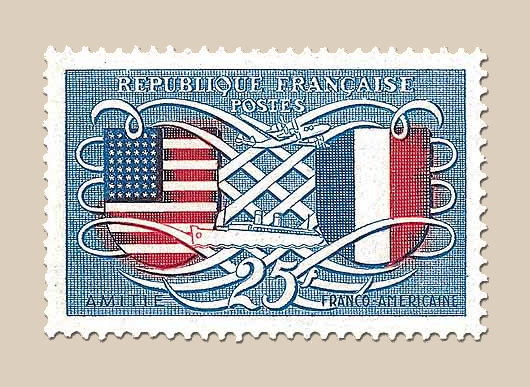France
About Andrew Cusack
 Writer, web designer, etc.; born in New York; educated in Argentina, Scotland, and South Africa; now based in London.
Writer, web designer, etc.; born in New York; educated in Argentina, Scotland, and South Africa; now based in London. read more
News
Blogs
Reviews & Periodicals
Arts & Design
World
France
Mitteleuropa
Knickerbockers
Argentina
The Levant
Africa
Cape of Good Hope
Netherlands
Scandinavia
Québec
India
Muscovy
Germany
Academica
Chartres 2015
Chartres is filed in my mind as the cathedral of my childhood. I must’ve been around 4 or 5 when I first walked amidst this medieval vision of stone and stained glass — some years before I ever visited the cathedral of New York where I was born. Cathedrals offer a prodigious mental stomping ground for the imagination of a young boy, and David Macaulay’s pen-and-ink book Cathedral (winner of the 1975 Deutscher Jugendliteraturpreis — take note!) I read and re-read over and over again as a child.
The marvel of this great church is that, while most medieval cathedrals took centuries to build, Chartres was constructed in an astonishing fifty-four years between 1194 and 1250, lending it a unity as an architectural composition that puts its rivals to shame. Chartres was made a diocese as early as the third century and tradition even upholds that from around the year 50 B.C., local Druids who had heard the prophecies of Isaiah here enshrined a statue of the ‘Virgo Paritura’, the Virgin-who-will-give-birth.
Having such a long history, Chartres’ fortunes have waxed and waned. In medieval times it was one of the most popular pilgrimage shrines in all of Europe, and in the 11th and 12th century its cathedral school far outshone England’s provincial attempt at a university at Oxford. But France’s civil wars and then revolution put an end to the town’s days as a destination for pilgrims until the poet Charles Péguy revived them himself in the years leading up to the First World War.
For the past thirty-three years, the largest pilgrimage to Chartres has been undertaken over Pentecost weekend, a bank holiday in France which happily coincided with our second May bank holiday in Great Britain this year. On this trek, over 11,000 pilgrims walk all the way from Notre Dame de Paris to Notre Dame de Chartres. Our chapter of about twenty pilgrims marched under the banner of Notre Dame de Philerme, patroness of the Order of Malta — mostly French and British but with a few participants from other countries as well. (more…)
Faith, Freedom, and Respect
Religion grows in the very depths of our being. Mocking it, ridiculing it, can be especially hurtful.
by FRANÇOIS HUGUENIN
Unanimous France has marched on January 11 in the name of Charlie to defend freedom of expression. Is it useful to say at the start that, at this moment of national unity, I agree with the condemnation of these heinous acts of terrorism and that I welcome hearing some courageous voices dare to finally name the danger — radical Islamism? But I am surprised and worried to see a France that, with the resultant “diversity” noticeable in its absence, is becoming a supporter of a newspaper that it never bothered to read. The defence of freedom of expression seems to have created an epidemic of blindness with respect to the problems, not of the freedom to express ideas, but of the manner in which that freedom is used.
It is clear that freedom of expression is regulated in France, since some words (such as those inciting racial hatred) are legitimately subject to prosecution, while there are no laws against blasphemy. But the question posed by the humour of Charlie Hebdo, that everyone will enjoy according to their own standards, seems to be beyond the law. If liberty is a core value of our society, conquered after many struggles, is it assigned an absolute value that is greater than all the others? Doesn’t the motto of our republic put it at the same level of equality and fraternity? In the name of fraternity, we can not take seriously a value that is unlikely to be framed in legal texts, as it is impossible to codify, and yet is inherent in the dignity of man and entered in the heart of everyone: that of respect for others. This is precisely what makes a large contribution to the charm of life: giving up one’s seat on the bus to let an elderly person sit; politely asking your neighbour to lower the volume of his music instead of yelling in the stairway “Turn it down!” — none of this is prescribed by law, but it makes life better.
Now, if there is a value to be respected in others, it is his religion. (more…)
Evolution of a Napoleonic Parliament
The Salle des états in the Palais du Louvre
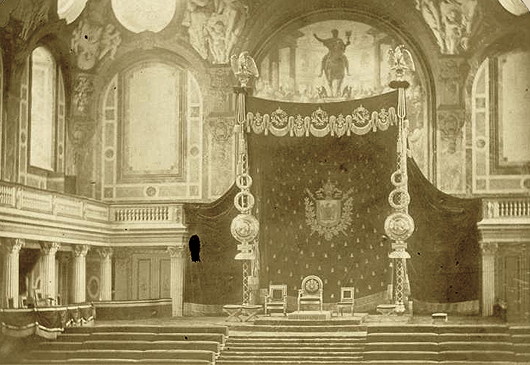
Among the numerous rituals of the ordinary visitor’s pilgrimage to Paris — trip up the Eiffel Tower, lunch at a tourist-trap café — braving the teeming hordes in the Louvre to view da Vinci’s ‘Mona Lisa’ ranks near the top. What very few of the camera-toting hordes realise is that they are shuffling through the room that once housed France’s parliament. The history of the Palais du Louvre is long, exceptional, and varied.
Originally built as a stern castle in the 1190s, the Louvre’s secure reputation led Louis IX to house the royal treasury there from the mid-thirteenth century. Charles V enlarged it in the fifteenth century to become a royal residence, while François Ier brought the grandeur of the Renaissance to the Louvre — as well as acquiring ‘La Gioconda’. In 1793, amidst the revolutionary tumult, part of the palace was opened to the public as the Musée du Louvre, but the Louvre has always housed a variety of institutions — the Ministry of Finance didn’t move out until 1983.
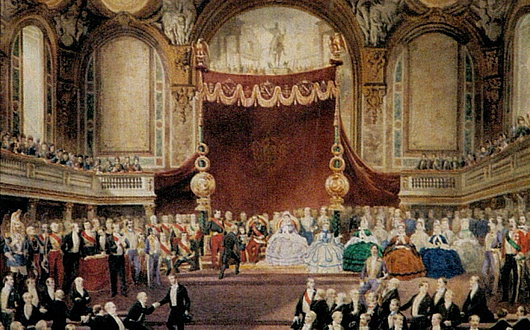
Napoleon III took as his official residence the Tuileries Palace which the Louvre was slowly enlarged towards over the centuries to incorporate. The Emperor needed a parliament chamber close at hand so he could easily address joint sittings of the Senate and the Corps législatif (as the lower house was called during the Second Empire) which opened the parliamentary year. By doing so at his residence, the Bonaparte emperor was following the example left by his kingly Bourbon predecessor Louis XVIII. (more…)
Two Flags Based on the French Tricolour
The French tricolour is one of the most influential flags in history, inspiring most prominently perhaps the Italian and Irish flags, but also dozens other, including the nationalist triband flags (like those of Germany, Russia, etc.). Indeed, the national flags of nearly sixty UN member states are based on these vertical or horizontal stripe combinations.
While long identified with revolution, republicanism, and nationalism, the French flag originally represented a combination of the blue and red of Paris — the colours of Saint Martin and Saint Denis — with the white of the French monarchy. Two (non-national) flags based directly on the French tricolour are those of the Acadians in North America and of Franschhoek in South Africa. (more…)
‘Bon Voyage’
Jean-Paul Rappeneau’s ‘Bon Voyage’ (2003) is one of those superb films that come around all too rarely. It manages to balance perfectly all the elements of drama, comedy, action, and romance, set in a convincing historical context.
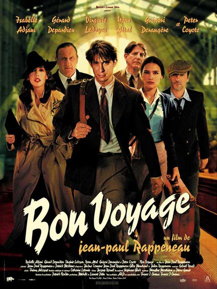
Bon Voyage
Jean-Paul Rappeneau
2003, France
1 hour 54 minutes
In 1940, Viviane Denvert (played by Isabelle Adjani) is a fickle, self-promoting film star who enlists her childhood friend, Frédéric Auger (Grégori Derangère), to extract herself from a compromising situation. As war creeps upon France, Auger finds himself behind bars for Viviane’s crime, but in the confusion of battle he manages to escape with the seasoned ne’erdowell Raoul (Yvan Attal). All of Paris is fleeing the German advance, and on the train to Bordeaux the two come across physics student Camille (Virginie Ledoyen) who helps them reach the western city by car when the train is stopped on the line.
In Bordeaux we come across government minister Jean-Étienne Beaufort, Viviane’s lover whom she uses to get Frédéric out of a sticky situation resulting from her own manipulation of him. Meanwhile, with all of Paris in Bordeaux, Viviane comes across another ex-paramour, Alex Winckler (Peter Coyote), keeping an unnatural interest in the affairs of the government, while the physics student Camille and her mentor Professor Kopolski are harbouring an important cargo they are determined must not fall into the hands of the Germans.
For fear of spoilers, that is all I will say about the plot, but it all comes packaged in a score by Gabriel Yared, better known for his scoring of ‘The English Patient’, ‘The Talented Mr. Ripley’, and Florian Henckel von Donnersmarck’s ‘Das Leben der Anderen’. The film was nominated for eight César awards in 2004 — best costumes, best director, best editing, best film, best original score, best sound editing, best supporting actor, and best writing — while it won three Césars that year for photography, best set design, and, for Grégori Derangère, best promising actor. (more…)
Some Aspects of the Fall of the Fourth Republic
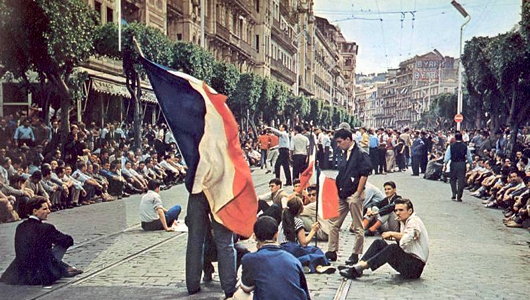
(Only interesting, I’m afraid, to those reasonably acquainted with the situation of France in May 1958)
• The French-Algerian instigators of the military rebellion led by Salan didn’t know what to make of him when he was first appointed to Algeria so they decided, just to be on the safe side, to assassinate him on his first day on the job. Salan survived the bazooka attack on his office but his ADC was killed. The general later became the only socialist freemason to lead a right-wing terror group (the OAS).
• Once the Algiers rebellion commenced and travel between Algeria and metropolitan France was cut, many supporting figures made their way across the Mediterranean by whatever means at hand. Soustelle managed to escape his police guards and get to Algiers via a secretly chartered Swiss plane, but the more romantically inclined Roger Frey — later Minister of the Interior — first tried to get to Algiers on the actor Errol Flynn’s yacht. It didn’t pan out, and instead he was forced to hire the boat of an English ex-naval officer turned smuggler.
• The man in charge of wiretapping French telephones was unsure which side would emerge on top so cautiously refrained from giving the government the full picture of the information his wiretaps revealed.
• When Corsica was seized by the rebels, Moch, the Interior Minister, decided to send in the elite of the police force, the CRS. He was afraid, however, that military transport planes would fly them directly to Algeria, so he was forced to commission Air France planes instead. Upon landing in Corsica, the entire CRS contingent was met by the rebel parachute regiment and immediately defected to the rebellion.
• So widespread was the reluctance to support the government against the military rebels that even the meteorologists send false warnings of storms in the Mediterranean in the hopes of keeping the French Navy from moving against the rebels in Algiers.
• The air force was particularly keen for de Gaulle to take power, and took to flying planes in a Cross of Lorraine formation, as well as sending troop transport planes to Algeria in case they would be needed to invade mainland France.
• Regional military commanders in France varied in their loyalty to the government and sympathy for the rebels. One commander is alleged to have told the regional prefect “M. le Préfet, I am not here to defend your préfecture, but to take it.” Other prefects warned the cabinet that any orders for the police to arrest those suspected of aiding the rebellion might result in the prefects instead being arrested themselves.
• The government had sometimes ordered firemen to unleash their water hoses against rioters in the past. As popular support for the cabinet faded away, the head of the fire brigade felt compelled to inform ministers that his men would not take part in any anti-riot measures but would merely put out any fires that erupted. “And,” he said, referring to the home of France’s National Assembly, “in the Palais Bourbon, they wouldn’t bother.”
• As Philip Williams reports in his article “How the Fourth Republic Died”:
At that night’s cabinet Pleven summed up: “We are the legal government, but what do we govern? The Minister for Algeria cannot enter Algeria. The Minister for the Sahara cannot go to the Sahara. The Minister of Information can only censor the press. The Minister of the Interior has no control over the police. The Minister of Defence is not obeyed by the army.” Said a left-wing Gaullist in the Assembly, “You are not abandoning power — it has abandoned you.”
France Marches for Marriage
Led by a provocative comedian, a gay atheist, and a socialist teacher, protest against same-sex marriage draws one million
As many as a million protesters descended upon Paris from every corner of France today to demonstrate their opposition to the Socialist government’s plans to introduce same-sex civil marriage. The Prefecture of Police estimates at least 380,000 participated in the three marches from different starting points that converged at the Champs de Mars in front of the Eiffel Tower. Organisers, however, set up counting stations and claim that, by 7:30pm tonight, over one million protestors had joined the march.
Volunteers charted more than eight hundred vehicles to bring protestors to Paris, while six TGV high-speed trains were reserved for demonstrators. “Had the conditions for chartering trains not been as stringent,” an organiser told Le Figaro “the number could easily have been double.”
“In the freezing cold,” Le Figaro reports, “young, old, and families with children were trying to keep warm waving thousands of pink flags to the jerky rhythm of techno music.”
The entire workforce of the Directorate of Public Order & Traffic was called out to handle the massive demonstration, which forced a Paris Saint-Germain football match to be brought forward. Police believed it would be impossible to secure the area around the Parc des Princes stadium when hundreds of thousands of protesters were expected in the centre of the French capital.
The protest today was organised by the eccentric comedian Frigide Barjot, founder of the Collectif pour l’humanité durable, joined by gay atheist Xavier Bongibault of the association Plus gay sans mariage (“More Gay Without Marriage”), and Laurence Tcheng of La gauche pour le mariage républicaine (“The Left for Republican Marriage”).
The unlike troika claim to have launched “a guerrilla war” against the current Socialist Party government’s proposed same-sex civil marriage legislation. Avoiding the mainstream media, ‘Team Barjot’ went direct to supporters through social media such as Facebook and Twitter, and, countering the government’s branding of same-sex civil marriage as “Mariage pour tous”, named their protest “Le Manif Pour Tous” (‘The Protest for All’), asserting that all children have a right to a mother and father.
If opinion polls are to be believed, the campaign against the proposed law seems to be changing perceptions. From 2000 to 2011, polls showed a steady rise in support for same-sex marriage. In 2012, this percentage began to decline; support for allowing same-sex couples to adopt also fell. Meanwhile, polls claim that 69% prefer same-sex marriage be put to a referendum. (more…)
‘Called Before the Tribunal of Reason’
Some Essays of Pierre Manent in English
I’VE BEEN ON a Pierre Manent kick recently, whom a friend in Paris describes as “a giant, grossly under-rated in the Anglophone world and treated with considerable disdain even in France on account of not being a prisoner of ephemeral conventional wisdom. ”
Given the current penitential season, it might be worth reading Manent’s “Reason and Faith: A Lenten Reflection”. This paragraph was one among the many that struck me with its accuracy:
Christian faith, for its part, accepts being called to appear before the tribunal of reason. It is distinctive of the Christian God to leave man to his own counsel, and to put the fulfilment of the plan of salvation as it were at the mercy of human freedom. This is why Christianity is not a law, but a faith. This is why the Bible is not a teaching dictated by heaven like the Koran. It is a chronicle, full of detours, of an often-broken and ever-renewed covenant between divine goodness and human freedom.
Much of Manent’s pondering is on the realm of political philosophy. His 1999 essay “The Return of Political Philosophy” explores the death of political philosophy over the course of the twentieth century, while his lecture “Current Problems of European Democracy” examines the depoliticisation of European societies. “The Greatness and Misery of Liberalism” is also worth a read.
A Place in Paris
With a view over the Place des Victoires
If you’re in the market for a little place in Paris, centrally located, Knight Frank has got just the thing for you. Admittedly, it’s only a wing of a larger hôtel particulier on the Rue Vide-Gousset, but it has an enviable view over the Place des Victoires. Mind you, I’ve always been of two minds about the Place des Victoires. I’m not particularly a fan of Louis XIV, whose somewhat silly equestrian statue presides foppishly over the centre of the circus: I’ve always blamed him for the French Revolution, failing to heed Margaret Mary Alacoque’s warnings and all that. But the statue’s only been there since 1828, so perhaps it can be replaced with something better in a suitably classical style. (more…)
Valle Adurni on Catholic France
The blogger ‘Pastor in Valle’, who writes over at his blog Valle Adurni, recently composed a splendid overview of Catholic France basically from the baptism of Clovis onwards. Of course, it’s a very general overview, but Pastor has rather skillfully managed to manage to pack a lot into relatively few words.
It’s in five sections: here are the first, second, third, fourth, and fifth.
The Architecture of Immaturity
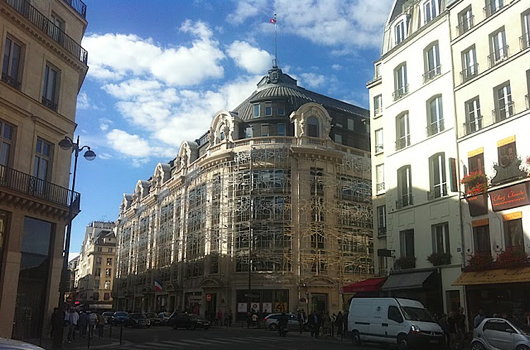
Have you ever come across the French Ministry of Culture on the Rue Saint-Honoré? It’s a perfect example of the architecture of immaturity. The government ministry was formerly strewn across nineteen different sites throughout Paris. The decision was made to consolidate their offices in one place, and the suitably central location near the Palais Royal was chosen.
The main building on the site is a handsome building from the late nineteenth-century or at the latest 1900s, with a modern 1960s office building stuck behind it. The Ministère chose architect Francis Soler to “unify” the buildings into one. At first, this was meant to be done solely through an interior reorganisation, but Soler decided to add a strange grille to the façade. (more…)
Nobility and Dignity at the Café Valois
Farewell, O good old days! Farewell, O affable visage of the proprietor and smiling and respectful reception of the waiters! Farewell, O solemn entries of the Café Valois’ dignified customs, which people were curious to see. Such was the case with the Knight Commander Odoard de La Fere’s arrival.
At exactly noon, the canon of the Palais-Royal heralded his arrival. He would appear on the threshold and pause for a moment to sweep the salon with an affable and self-assured gaze as someone eager to practice a longtime custom. His right hand pressing firmly on the white and blue porcelain handle of his cane, he threw his old faded brown cape over his shoulder with a swing of his left hand. No one ever snickered at this, since not even the most elegant mantle with golden fleur-de-lys embroidery was ever thrown back with a more distinguished movement.
In 1789 the former steward of the Prince of Conti ran the Café Valois; it was rather devoid of political colour and local flavor at that time.
Among the frequenters of the place, standing out by his noble manners, stately demeanor and wooden leg, was the Chevalier de Lautrec. He was from the second line of that family, an old brigadier of the king’s army, a Knight of Malta, of Saint Louis, of Saint Maurice and of Saint Lazare.
The Chevalier de Lautrec was a middle-aged man who lived a modest, though very dignified life on his small pension. Though he rarely appeared in society, he could be seen most often at the Palais Royal and the Café Valois. He was a very cultured mind and an assiduous reader of all the newspapers.
Deprived of his pension overnight, it was never known what the Chevalier de Lautrec lived on at a time when it was so difficult to live, and so easy to die. But here we have something that sheds at least a dim light on this mystery.
One morning after finishing a very modest breakfast in the Café Valois, as was his custom, the Chevalier de Lautrec rose from his table, chatted with all naturalness with the proprietress, who stood behind a counter, bid good-day to the master of the café with a slight gesture of the eyes, and walked out majestically saying nothing about the bill. (more…)
Licorne Perdue
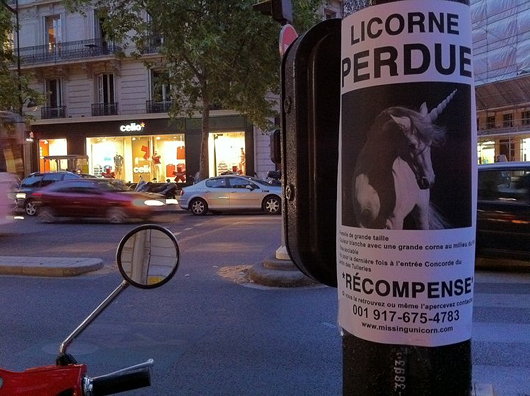
“Vu hier soir à Odéon” writes Nicholas S-M, posting this photo on Facebook.
Of course, my mind immediately wanders to Le Secret de La Licorne, the 3D film version of which (directed by Mr. Spielberg) will be released before the end of the year. I am sure I will hate it, but in that way you can hate things while still liking them.
French Flag-Fiddling
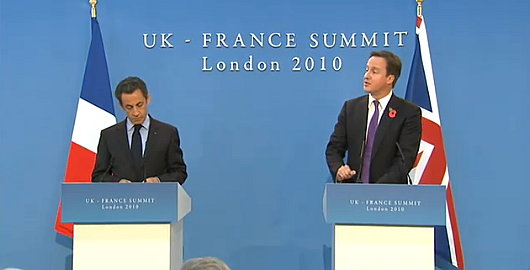
As if you needed more reasons to despise Nicolas Sarkozy! Well, this one we can’t even blame on him. Shall I explain? The national flag of France is a tricolour of three equal vertical stripes of blue, white, and red. Excepting the heady days of the Bourbon restoration, this has consistently been the French flag for the past two centuries now. A little while into the Sarkozy presidency, however, I began noticing a change only in the French flag as displayed whenever the President gave a press conference. The white stripe was reduced in width by half and the space on either side given to the neighbouring colours. The obvious deduction made was that the President wanted all three colours of the national flag shown whenever there were close-up press photographs of himself, and research confirms that this is the case. This shows an awareness for visual representation, but is nonetheless a highly unusual assault on the official flag of a nation. (more…)
Philippe Séguin
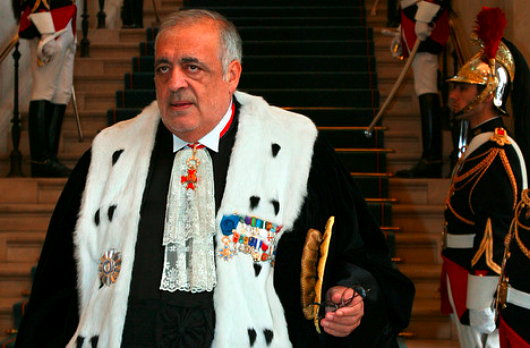
If you can possibly ignore its blood-soaked foundation and its disregard for the freedom of the Church, one can appreciate that the French Republic does republicanism with a dash of pizzazz, as evidenced by the late Philippe Séguin’s official robes as President of the Cour des comptes. Of course, most of this panache it inherited from its intermittent monarchic and (even more so) imperial past. It also inherited from Louis XIV an ever-present spirit of centralisation — the Republic frowns upon the principle of subsidiarity.
Monsieur Séguin was a decent sort. (more…)
Europe According to Stereotype
A London-based graphic designer has created a series of maps depicting Europe according to the national stereotypes in the minds of various peoples. Yanko Tsvetkov, a Bulgarian living in Great Britain, created the first one in 2009 in the midst of the energy dispute between Russia and the Ukraine. Russia was labelled “Paranoid Oil Empire”, the Ukraine “Gas Stealers”, and the E.U. as “Union of Subsidized Farmers”. Switzerland was simply “Bank”.
“I created the first one in 2009 because at that time there was an energy crisis in Europe,” Mr. Tsvetkov said. “I just created it to amuse my friends but when I put it up on my website so many people liked it that I decided to really focus on the project of mapping the stereotypes based on different places in Europe. I was surprised by the reaction because I never really expected it to take off like this.” (more…)
Chartres MMX
The Pentecost Paris-Chartres Pilgrimage 2010
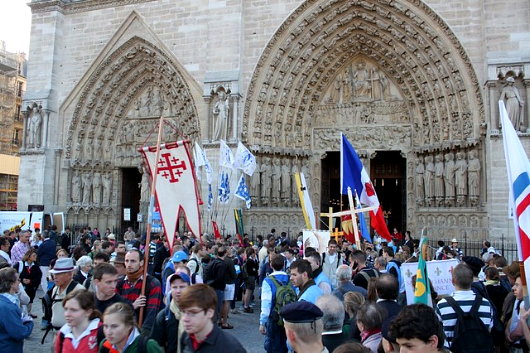
PENTECOST commemorates the descent of the Holy Spirit, often considered the birthday of the Church. Each year, this great feast of the Church is marked by the pilgrimage from the Cathedral of Notre-Dame de Paris on the Île de la Cité (above) to Notre-Dame de Chartres in the Orléanais by pilgrims young and old devoted to the traditional form of the Latin rite. The pilgrimage, often a feast of flags and banners, takes three days beginning on the Saturday of Pentecost weekend, continuing through the great feast itself, and arriving in Chartres on Pentecost Monday (which is still a public holiday in France). This year, Cardinal Vingt-Trois, the Archbishop of Paris, graciously led Benediction on the second day of the pilgrimage, and met with and blessed individual pilgrims. (more…)
French Intellectuals Pen ‘Appeal to Truth’ In Support of Benedict XVI
A number of prominent French men & women have written a ‘call to truth’ supporting Pope Benedict XVI in the current media storm and pedophilia scandal. As the Appeal’s about page says, Pope Benedict XVI “is the first pope to address head-on, without compromise, the problem. Paradoxically, he is the subject of undermining and personal attacks, attacks relayed with a certain complacency on the part of the press”.
The list of original signatories includes writers, essayists, literary critics, bloggers, professors, philosophers, businessmen, senators, members of parliament, mayors, publishers, actors, a Protestant minister, a Fields medal winner, and even a sexologist.
The ‘Appel à la Vérité’ is reproduced, in an unofficial English translation, below:
The cases of pedophilia in the Church are, for all Catholics, a source of profound grief and great sorrow. From members of the Church hierarchy were, in some cases, serious deficiencies and failures, and we welcome the Pope’s wish to shed light on these cases.
With the bishops, and as members of the Church, lay Catholics bear the brunt of the crimes of certain priests and failures of their superiors; they fall firmly, as Christ taught, on the side of those who suffer most from these crimes, the victims, while praying for the culprits.
As for us, we hope with all our hearts that the whole truth comes out and all in the Catholic Church that could enable these offenses brought to Christ should be discussed calmly and amicably amongst all men and women of good will.
At the same time, we regret the runaway and provocative press that accompany these cases. Beyond the legitimate & democratic right to information, we can only note with sadness, as Christians but also as citizens, that many media in our country (and in the West in general) treat these cases with bias, ignorance, or delight. Shourtcuts in generalizations, the portrait of the Church which is currently done in the press does not match the experiences of Catholic Christians.
While reiterating our horror at the crime of pedophile priests and our solidarity with the victims, we urge the media to an ethic of responsibility that would undertake a more ethical treatment of these cases. The effects of runaway media are, by far, reserved to the Church, but we are tired of and battered by this thrashing. We think of so many priests who courageously, and sometimes in solitude, bear the message of Christ.
We are with them.
We welcome the letter from the bishops of France to Pope Benedict XVI, and wish to see the Catholic Church, with serenity and responsibility, through this painful ordeal.
This appeal was launched at the initiative of François Taillandier (writer), Frigide Barjot (humourist), Natalia Trouiller (journalist & blogger), Koz (blogger & lawyer), and Francis Miclo (philosopher).
Original signatories (31 March 2010):
Jacques Arènes (pyschoanalyst and writer)
Denis Badré (senator)
Frigide Barjot (humourist)
Jean-Marc Bastière (journalist and writer)
Claude Bébéar (honorary president of AXA)
Michel Boyancé (Dean of the Institut de France and comparative philosopher)
Rémi Brague (philosopher, member of the Institut de France)
Alexis Brézet (journalist)
Jean des Cars (writer)
François Cassingena-Trévedy (Benedictine monk, liturgist and writer)
Jean Chélini (historian, permanent secretary of the Académie de Marseille)
Ghislain du Chéné (international coordinator of Foi et Lumière)
Colette Combe (pscyhoanalyst and writer),
François Content (Director-General of the Fondation d’Auteuil)
Philippe Delaroche (writer, journalist)
Chantal Delsol (writer and philosopher)
Patrick Demouy (historian, university professor)
Bernadette Dupont (senator)
Bertrand d’Esparron (corporate communications manager)
Emmanuel Falque (philosophee and writer)
Olivier Florant (sexologist)
Jean-Christophe Fromantin (mayor of Neuilly-sur-Seine, businessman)
Réginald Gaillard (Editions de Corlevour)
Patrick de Gméline (historian)
Samuel Grzybowski (President/founder of the association Coexister)
Fabrice Hadjadj (essayist and playwright)
Rona Hartner (singer, actress)
François Huguenin (writer)
Vincent Hervouët (journalist)
Yvon Jacob (chief executive, former member of parliament)
Gaspard-Marie Janvier (writer)
Pasteur Alain Joly (Lutheran Church)
Patrick Kéchichian (writer and literary critic)
Koz (blogger and lawyer)
Louis-Etienne de Labarthe (editor-in-chief, Il est vivant)
Philippe de Lachapelle (director of the OCH)
Laurent Lafforgue (mathematician, winner of the Fields medal)
Gérard Leclerc (essayist, journalist)
Henrik Lindell (journalist)
Michael Lonsdale (actor)
Victor Loupan (editor, La Pensée Russe)
Jean-Baptiste Maillard (journalist, essayist)
Bruno Maillé (teacher, essayist)
François Maillot (Director-General, La Procure)
Jean-Luc Marion (philosopher, member of the Académie Française)
Jean-Pierre Marcon (member of parliament)
Nicolas Mathey (Professor of Law, Université de Paris V)
Jean-Pierre Machelon (Professor of Law, Université de Paris V)
Marc Mennessier (journalist)
François Miclo (philosopher)
Jean-Marc Nesme (member of parliament & mayor)
Philippe Oswald (journalist)
Xavier Patier (writer)
Patrice de Plunkett (writer and blogger)
Hugues Portelli (senator)
Jean-Frédéric Poisson (member of parliament)
Aymeric Pourbaix (journalist)
Guillaume de Prémare (communications consultant, Médias & Evangile)
Edmond Prochain (blogger, journalist)
Samuel Pruvot (journalist)
Jacques Rémiller (member of parliament & mayor)
Alina Reyes (writer)
Damien Ricour (actor)
Ivan Rioufol (essayist, journalist)
Catherine Rouvier (jurist, political scientist)
Jean Sévillia (journalist, writer)
Grégory Solari (editor)
Raphaël Stainville (journalist)
Denis Sureau (editor, theologian)
François Taillandier (writer)
Denis Tillinac (writer)
Henri Tincq (journalist and writer)
Hubert de Torcy (editor-in-chief, L’1visible)
Vincent Trémolet de Villers (journalist)
Natalia Trouiller (blogger, journalist)
Didier Truchet (Professor of Law, Université de Paris II)
Patrick Tudoret (writer)
Christian Vanneste (member of parliament)
François de Wendel (business executive)
Search
Instagram: @andcusack
Click here for my Instagram photos.Most Recent Posts
- Sag Harbor Cinema March 26, 2025
- Teutonic Takeover March 10, 2025
- Katalin Bánffy-Jelen, R.I.P. March 3, 2025
- Substack Cusackiensis March 3, 2025
- In the Courts of the Lord February 13, 2025
Most Recent Comments
Book Wishlist
Monthly Archives
Categories

